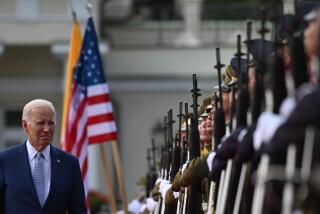NATO Caution on ‘Star Wars’ Won’t Affect Program, Weinberger Says
- Share via
WASHINGTON — Defense Secretary Caspar W. Weinberger said Thursday he believes that the apparent indecision of the European allies about whether to participate in President Reagan’s “Star Wars” program will have no effect on the program’s future.
With France clearly keeping its distance from the proposal for a space-based missile defense plan, West Germany showing new caution about participation and British leaders voicing support, the United States has been left in the position of trying to move ahead with the expensive research--without the unified support of the most powerful allies in the North Atlantic Treaty Organization.
Asked whether the mixed signals offered by the allies would have any effect on the program, known formally as the Strategic Defense Initiative, Weinberger replied, “No, I don’t think so.” But he added, “I think we need all the help we can get.”
Reduction Move
He predicted that the European reaction will have no impact on Congress, which has for a second year moved to reduce the President’s funding request.
The secretary, who returned Thursday to the United States after a particularly harmonious conference of NATO defense ministers, sought to clarify ground rules for European participation in the initial five-year research effort, for which the Administration wants to spend $26 billion.
His announcement in March that foreign participation was invited stirred up a diplomatic flap when it was interpreted as including a 60-day deadline for signing up--a deadline the Pentagon later said was never expressed or intended.
“There seems to be some confusion there as to whether a governmental response is required” to the invitation, Weinberger told reporters on the flight home from the meeting in Brussels. “I never felt a governmental response is required. What I wanted was to get their (the allies’) companies and scientific, educational institutions . . . all of (them) participating.”
The meeting in Brussels touched only briefly on “Star Wars,” when the Danish delegation reported on a decision in Copenhagen to oppose research on the program in Denmark, according to Weinberger.
However, the project--which Reagan is pushing as the central and most richly funded element in the Pentagon’s weapons research program--has become an undercurrent in U.S. military and diplomatic relations with its allies.
General Support
Earlier this month, Reagan won general support for the program when he attended a summit conference with the leaders of Britain, Canada, France, Germany, Italy and Japan.
But French President Francois Mitterrand has left U.S. officials puzzled by his proposal for a strictly European program, known as Eureka, to study the peaceful uses of space. This is in contrast to the Reagan program, which is intended to develop a system that would intercept and destroy enemy missiles at some point between their launching and landing.
One U.S. official questioned the purpose and direction of Mitterrand’s independent effort, saying that the Administration does not know what the French president had in mind.
Shift by Kohl
And West German Chancellor Helmut Kohl, listed earlier as a staunch supporter of the program, has--since the time of the seven-nation summit conference--put some distance between his government and the Reagan program. He is offering what U.S. officials have called “a very positive statement of support” while also warning that the program could have a “decoupling” effect on NATO’s joint defense efforts.
Reflecting what the Administration feels is the basis for Mitterrand’s--and other Europeans’--reservations about the “Star Wars” plan, Weinberger said some allies are “concerned about its newness (and) whether it will have any adverse effect on the negotiations in Geneva.”
Those talks, between the United States and the Soviet Union, are intended to produce agreements on reducing space-based weapons as well as medium-range and intercontinental nuclear missiles.
In addition, Weinberger said, “Europe hasn’t rejected it by any means. . . . There is a lot of interest stirring around.” However, he said he knows of no “Star Wars”-related contracts given to European companies or research institutions.
“If there were a very large number of contracts awarded to foreign bidders,” he said, “Congress might in effect try to slow that down,” out of concern that too much money was being spent beyond U.S. borders, at the cost of American jobs.
More to Read
Sign up for Essential California
The most important California stories and recommendations in your inbox every morning.
You may occasionally receive promotional content from the Los Angeles Times.













